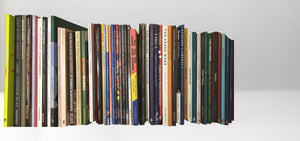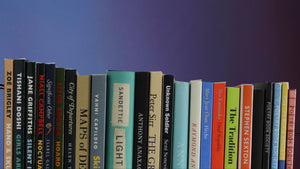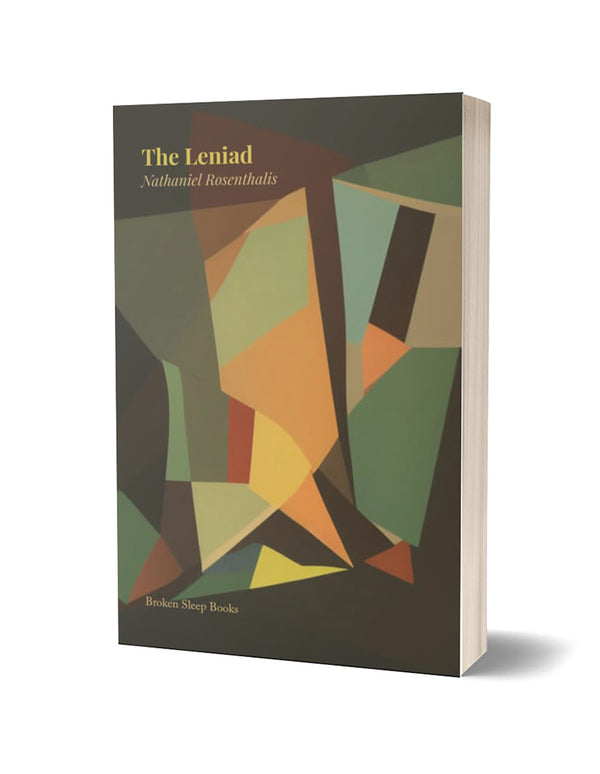The Leniad by Nathaniel Rosenthalis
Broken Sleep Books
Nathaniel Rosenthalis’ The Leniad is a mesmerizing, romantic, and surreal collection of poems. Rosenthalis writes with the care of the maker of the universe, turning everything over from the world’s tallest mountains to the smallest pebble on the beach, always landing on the exact word. Rosenthalis is a poet who “hears the highway is blue in a blur” and listens.
Praise for The Leniad:
Has the illusion of personal history and its attendant psychology ever been more succinct than in these poems? “Occasion: / last Friday. / Still bitter.” Rosenthalis’s long poem, “The Leniad,” takes Virgil’s Aeneid—that twelve-book epic that famously begins, “I sing of arms and the man”—and allows “the man” (here, named Leni instead of Aeneas) to speak for himself. When Leni talks about “arms,” he’s talking not about armor and spears but about “the arms of a man.” These poems revel in the delight of thinking, of writing, of language, of love, and of being brought down and built back up (like Rome from the ashes of Troy) after a break up. They are nothing short of remarkable, the kind of fun that makes you think.
— Mary Jo Bang, A Film in Which I Play Everyone
The Leniad takes inspiration from Virgil, from Dante, but The Leniad is like nothing else, its scope both epic (“…the last time I made this trip/ into the lower level of hell/the cliff face hadn’t yet collapsed”) and momentary (“the worried look of something about to turn in a wind”). This is an exhilarating journey, the frozen past and the grim here-and-now liberated, enlivened by discourse, intercourse, their astonishing offspring, poems both wildly inventive and brainy, erotically charged and heart-breaking. In the hands of the cerebral cortex, heartbreak sparkles.
— Kathryn Davis, Aurelia, Aurélia
“A little edge / was there, to put / his foot on.” In even the smallest moves of erotic self-consciousness that motivate and score these poems and sequences, Nathaniel Rosenthalis recalls how gods in antiquity would engineer propitious conditions where men’s desire wanted encouragement. If there is a ledge, a leverage, a favorable light, a volta, a vantage, this poet’s line will find it and savor its glimmer, against loss and caution and the world’s contingency. The hero of The Leniad has been equipped and delivered, without escape, to “Lust, that bluish type of situatedness.” No one said he couldn’t take notes.
— Brian Blanchfield, Proxies
Praise for Nathaniel Rosenthalis:
“My devotion, after all/is that I even got up,” says Nathaniel Rosenthalis, belying the title of his mesmerizing debut, I Won’t Begin Again. For, in poem after poem, Rosenthalis argues for – and enacts – resilience in a world where doubt can seem “the architecture of the moment.” “Not fantasizing, not hoping, was error also,” and indeed these poems resist the world’s (and the self’s) instability by noticing the least detail (“it was like/resistance//to notice, so/I did. And do”) but through a teetering of vision: a green wall is “millionly leafy,” the sun “crumples one random can,” which is to say that the poems are acts of reinvention, of reimagining life’s possibilities. Philosophical, surreal in the tradition of Rimbaud’s Illuminations, and slyly erotic, I Won’t Begin Again is finally a triumph of emotion, what Rosenthalis defines as “putting yourself over another/to make a different sense.” I feel changed by these poems – powerfully so, gratefully.
— Carl Phillips, Then the War
A poetics of localized intense being—no, a poetics of intensive being, localized at one point to “an arm movement whose flipside is my tender wrist,” at another to “a tiara floating.” Nathaniel Rosenthalis writes less of what one does daily and more of what one is, the thus of what one is, distilled, malty, vialed up—then spilled. OK. I love these poems; that’s simpler to say but doesn’t get at the “deadpan glamor” of this poet’s very particular kind of (un)canny—it’s both—grammar and mordant enjambment (“Be redundant / to a shamefastness / you were // made real through”) which, enthralled, I heed.
— Aditi Machado, Emporium
They say timing is everything. I can’t remember what they say that about. Romance? Language? In Nathaniel Rosenthalis’ I Won’t Begin Again, timing is everything is true for just about everything. From mis-overhearing small profundities on the street to ‘the motion of coming down a stair,’ Rosenthalis shows that our inescapable timelines are beautiful and lonely and funny.
— Sommer Browning, Good Actors
Nathaniel Rosenthalis’s poems have a beguiling transparency and simplicity that serve as winsome screen for the complications provided by his syntax and his emotional orientation toward curlicue, paradox, and detour. I’m instantly drawn into Rosenthalis’s imaginative world and I want to stay there forever.
— Wayne Koestenbaum, Figure It Out
What an amazing range of language!—but no matter how far out it goes, it always lands exactly right. And right in the middle of the infinitesimal moments that actually determine human relationships—the glance back, the sudden laugh, the walking down a stair—Rosenthalis finds the precise points at which people actually connect. An uncanny intuition leads both form and content to fuse with a certainty that rings and a compassion that radiates throughout.
— Cole Swensen, On Walking On
Not just insight, but the strange detours consciousness must take to know itself--”I’m interested in the edge/I strive toward;” not just desire, but the strange ways it flashes in and out of time; there’s no one writing quite like Rosenthalis. “Buscando ser más,” said Paulo Freire, and this is poetry that demands more, from experience, the self, the poem itself. A deep sense of responsibility to the art shines through…. This is an extraordinary debut.
— D. Nurkse, A Night in Brooklyn
John Ashbery wrote of Jennifer Bartlett, whose Air: 24 Hours paintings inspired the breezy poems in Nathaniel Rosenthalis’s 24 Hour Air, that it was her habit “to begin with a basic concept and work it out ad absurdum, ultimately sabotaging its ‘purity’ with freewheeling improvisation.” The same applies here, where the sensuousness of the quotidian is released from the day’s regimen, attaining the measured extravagance of, say, mirrors, liriopes, and, why not, expansive towels. Like the day’s events, the phrases and images in these poems repeat and recombine now and then, reminding us that regularity doesn’t preclude our daily extemporizing but rather delimits its boundaries. Read this work and wonder, again, why the day can’t have more than twenty-four hours.
— Mónica de la Torre, Repetition Nineteen
ABOUT Nathaniel Rosenthalis:
Nathaniel Rosenthalis is the author of The Leniad (Broken Sleep Books, 2023). His debut book of poems, I Won’t Begin Again, won the 2021 Burnside Review Press Book Award, selected by Sommer Browning. His poems have appeared in Granta, The Chicago Review, New American Writing, Lana Turner, The Harvard Advocate, Denver Quarterly, Conjunctions, and elsewhere. Based in New York City, he teaches writing at NYU and Columbia University and also works as an actor and singer.
Broken Sleep Books

MEMBERS ENJOY 25% OFF ALL POETRY BOOKS

Join the Poetry Book Society for 25% off all books
Join the Poetry Book Society for 25% off all books

